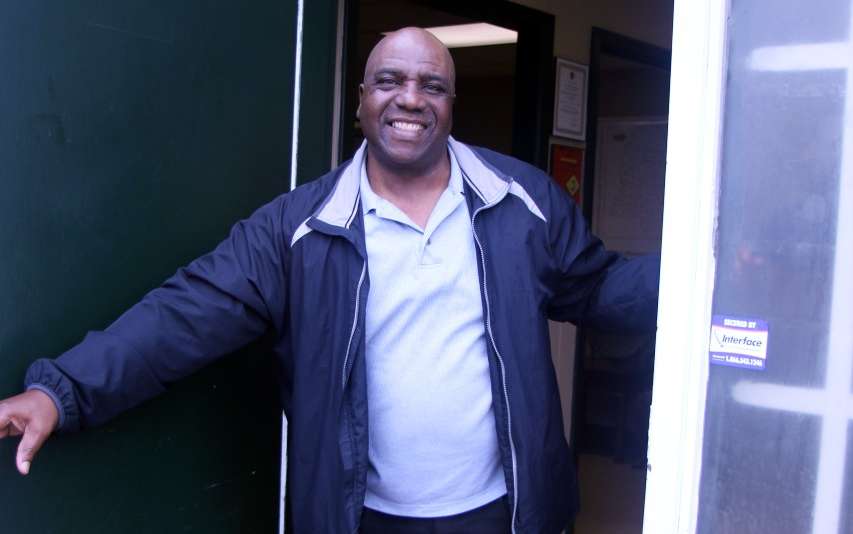Oxfam has been working in the Gulf Coast for more than a decade, providing emergency relief after Hurricane Katrina and investing in green jobs after the BP oil spill. Today, our Good Jobs Program connects some of the area's most marginalized people with access to decent, stable work.
Scarred with potholes, the road to West Jackson, Mississippi, runs along a battered freight rail line, past boarded-up businesses, abandoned houses, and scrapyards strung with barbed wire. The desolation is palpable, and no wonder: Household income in this neighborhood is less than a third of the national median, and the crime rate is roughly three times the national average.
But along the way is a building that, although dilapidated, holds promise: New Way Mississippi. Staff there provide transitional housing, employment training and placement, transportation, coaching in life skills, and a sense of dignity and responsibility for homeless veterans, recovering addicts, and others seeking help. But the organization’s primary work is with “returning citizens”—formerly incarcerated individuals—who are on a long road to what New Way Mississippi calls “restoration.”
“It’s so difficult coming out of prison,” says Executive Director Larry Perry, himself a recovering addict. To secure their release, returning citizens need to prove they have a home base free of drugs and crime. “If you don’t have an address, you can’t get a job. If you don’t have a job, you can’t save money to get a home.”
A pilot workforce development program
“You see so many homeless people on the streets of Jackson at night; it’s heartbreaking. Many of them have been released from prison and have nowhere to go,” says Joi Owens, Oxfam's program lead for the Gulf Coast. She realized there had to be a way to connect programs that train workers in hard and soft skills to employers who would provide jobs—and “not just jobs, but good jobs.”
She and New Way staff contacted the city of Jackson and worked with city leaders to create a “re-entry workforce pipeline” called the Good Jobs Program. New Way is now training workers for jobs in a major public works program in the city that involves upgrading the fiberoptic infrastructure. The new broadband network will provide high-speed internet to educational institutions and hospitals, but it’s also expected to attract young entrepreneurs to Jackson, where real estate is inexpensive and plentiful. The organization has also partnered with a number of employers, which will result in roughly 50 people getting the skills they need for full-time employment. A place like New Way is essential today, as incarceration rates have skyrocketed over the past 30 years. Mississippi ranks third in the US for incarceration. Moreover, mass incarceration has disproportionately locked up Black men. While Blacks are 37 percent of Mississippi’s population, they are 57 percent of the prison population; over 90 percent are male.
Eventually, thousands of people return to society each year, suffering from “lasting effects that we don’t consider,” says Larry Christian, New Way’s development director. “Any normal person would be traumatized by this.” He says New Way Mississippi’s program deliberately prompts a “psychological switch” in participants.
“In prison, every day someone is telling them what to do, [and] how to do it. In society, you have to make decisions about everything.”

Dealing with stigma
“If you’re a convicted felon, don’t nobody want to hire you,” says Daphne Harris, mother of three and grandmother of two, who ended up in prison after struggling with drugs and alcohol. “I’ll be an addict until the day I die. ... But New Way shows that I’ve changed my ways, and I’m ready to get back into society.”
After three and a half years in prison, Harris was ready to gain the skills she’d need to deal with society, and land a job. At New Way, she learned how to build a résumé and conduct herself during an interview, and she soaked up information about using computers and being online.
After Harris graduated in November, New Way hired her to manage its thrift store in Clinton (a prosperous suburb). Harris regards this position as a mark of trust and an endorsement of her skills. “I open and close the store three days a week. When people donate things, I go online to find comparable items to price them. I learned how to use a cash register for the first time.”
A comprehensive agenda for the working poor
“While Mississippi has the highest poverty rate in the country, it’s not because people don’t work. It’s because so many jobs here pay low wages,” Owens says. The Good Jobs Program concentrates on changing systems that will improve jobs, and access to jobs. To that end, Oxfam also works on a robust policy agenda at the federal level, and on the state and local levels in Mississippi and Louisiana.
Owens hopes that as more workers find decent jobs, the economic landscape in Mississippi will improve. “As families move out of poverty, the impact is dramatic,” she says. “Housing, nutrition, health, [and] education are all directly linked to improving economic security.”
This initiative is possible in part from a grant from the W.K. Kellogg Foundation. This story was originally published in our Spring 2019 issue of CloseUp.
